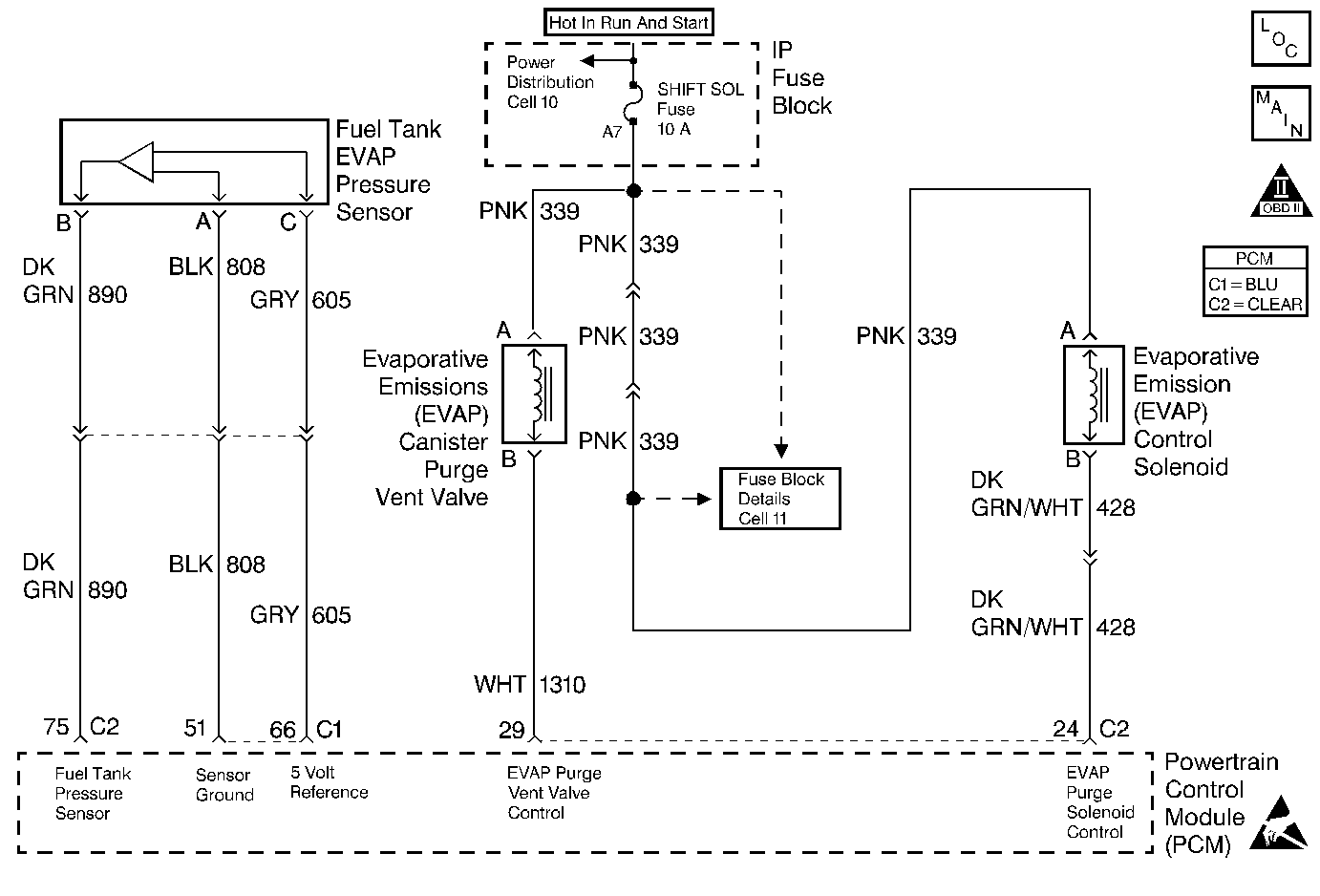
Circuit Description
The PCM contains chips called Output Driver Modules that provide 7 switchable ground outputs for operating solenoids, relays, telltales, and other devices. Each of these ground outputs has fault lines that feed back to the PCM's microprocessor. When the output is OFF, the output driver should receive the 12 volts fed to the solenoid, relay, etc. When the output is ON, it should receive 0 volt since it is grounding the output. If it receives 0 volt when the output is OFF or 12 volts when the output is ON, it sets the fault line low. DTC P1645 is used to monitor the fault line of the EVAP control solenoid.
Conditions for Running the DTC
| • | DTC P1640 not set. |
| • | Engine running at least 10 seconds. |
Conditions for Setting the DTC
Fault line is low for 2 seconds.
Action Taken When the DTC Sets
| • | The PCM will illuminate the Malfunction Indicator Lamp (MIL) when the diagnostic runs and fails. |
| • | The PCM will record operating conditions at the time the diagnostic fails. This information will be stored in the Freeze Frame and Failure Records. |
Conditions for Clearing the MIL/DTC
| • | The PCM will turn the MIL OFF after three consecutive drive trips that the diagnostic runs and does not fail. |
| • | A Last Test Failed (current) DTC will clear when the diagnostic runs and does not fail. |
| • | A History DTC will clear after forty consecutive warm-up cycles with no failures of any emission related diagnostic test. |
| • | Use a scan tool to clear DTCs. |
| • | Interrupting PCM battery voltage may or may not clear DTCs. This practice is not recommended. Refer to Clearing Diagnostic Trouble Codes in Powertrain Control Module Description . |
Diagnostic Aids
Use the Failure Rec. to aid in diagnosing an intermittent fault. Use the data captured when the DTC set to determine if an open or shorted condition caused the DTC to set.
Step | Action | Value(s) | Yes | No |
|---|---|---|---|---|
1 | Did you perform the Powertrain On-Board Diagnostic (OBD) System Check? | -- | Go to Step 2 | |
2 |
Are DTCs P1633 or P1644 also set? | -- | Go to diagnosis for the DTC that is set | Go to Step 3 |
3 | Are DTCs P0753, P0758 or P1860 also set? | -- | Go to Step 10 | Go to Step 4 |
4 | Using a scan tool view the EVAP Sol. Driver display. Does the display indicate OK? | -- | Go to Step 5 | Go to Step 6 |
5 |
Does the display indicate OK while the EVAP sol. is commanded ON? | -- | Fault not present. Refer to Diagnostic Aids | Go to Step 9 |
6 |
Is the voltage the same or more than the value specified? | 10 V | Go to Step 15 | Go to Step 7 |
7 |
Is the voltage the same or more than the value specified? | 10 V | Go to Step 8 | Go to Step 11 |
8 |
Is the voltage the same or more than the value specified? | 10 V | Go to Step 12 | Go to Step 13 |
9 |
Is the voltage the same or more than the value specified? | 0.5 V | Go to Step 14 | Go to Step 12 |
10 | Repair open or short (blown fuse) in the ignition feed circuit between the fuse and all components connected to the fuse. Refer to the wiring schematic for affected components. Is the repair complete? | -- | -- | |
11 | Repair the open or short (blown fuse) in the ignition feed between the EVAP solenoid and the splice. Is the repair complete? | -- | -- | |
12 | Replace the EVAP solenoid. Is the repair complete? | -- | -- | |
13 | Repair open or short to ground in the EVAP Purge Solenoid control circuit between the EVAP solenoid and the PCM. Is the repair complete? | -- | -- | |
14 | Repair short to voltage in the EVAP Purge Solenoid control circuit between the EVAP solenoid and the PCM. Is the repair complete? | -- | -- | |
15 |
Was terminal contact repaired? | -- | Go to Step 16 | |
16 | Replace the PCM. Refer to Powertrain Control Module Replacement/Programming . Is the replacement complete? | -- | -- |
